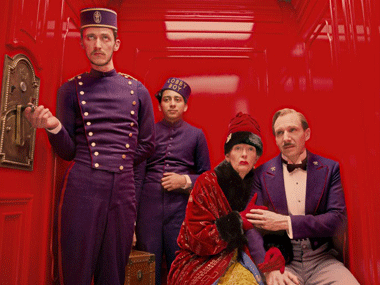Wes Anderson’s The Grand Budapest Hotel was selected as the opening film of the 64th Berlin International Film Festival and it lives up to all the expectations of both cinephiles and hipsters that director Wes Anderson carries upon his shoulders. The film, based on a novel by Stefan Zweig, is a picaresque caper that has its hero a dashing, suave, sexy concierge Gustave H (Ralph Fiennes). Gustave works in a European Alpine hotel in the fictitious town of Zubrowka, and preys on rich old ladies, giving them a jolly good time as well as warming their beds. Gustave’s Sancho Panza in his adventures is lobby boy Zero Moustafa, played with deadpan loyalty by Toni Revolori. When one of elderly dames, Madame D. (a luminous Tilda Swinton), dies and leaves a valuable painting in her will to Gustave, her family will stop at nothing to retrieve the painting. The story is told in flashback by the mysterious owner of the once grand hotel to a hotel guest (Jude Law). The owner was once lobby boy and the story unfolds through his eyes. [caption id=“attachment_1382067” align=“alignleft” width=“380”]  The film, based on a novel by Stefan Zweig, is a picaresque caper that has its hero a dashing, suave, sexy concierge Gustave H.[/caption] Anderson is well-loved for his quirky, eccentric characters and distinctive filmmaking (Moonrise Kingdom, The Royal Tenenbaums, The Darjeeling Limited). He is known for handcrafted filmmaking, meticulous attention to detail, exquisite photography, sharp dialogue, magnificently rich retro sets and production design, and intense lipstick colours. The Grand Budapest has all this and it is unmistakably Anderson at his quirky best. The film is also hysterically funny. It says something for Anderson that top stars would participate in an ensemble film, many for a role of just a few seconds. However brief their roles, however, every character in The Grand Budapest Hotel is memorably etched. The cast includes Jude Law, Bill Murray, Willem Dafoe, Edward Norton, Saoirse Ronan, Jeff Goldblum, Harvey Keitel and Lea Seydoux. And of course, there is the stylish sardarji, Waris Ahluwalia, in full turbaned splendour. Most impressively, though the film leaps across many diverse settings – from a decadent, semi-ruined hotel to a prison, and cable cars to ski slaloms; from live action to animation; a top heavy ensemble cast – there is an unwavering coherence in the storytelling. In the hands of a lesser director, The Grand Budapest would have fallen apart. It also doesn’t shy of acknowledging serious themes like xenophobia and racism. For instance, at one point, Gustave makes a vicious attack on Zero, accusing him of being an immigrant with no civilisation to speak of, though Gustave does redeem himself by standing by Zero when the latter is about to be picked up by the militia because of dubious visa papers. The film has been made with a ferocious delight that is absolutely infectious. Fiennes is magnificent form as he throws himself into the role, firing all cylinders. The actor is well known for playing intensely serious roles to perfection, but in this film, Fiennes reminds us that he’s also a fine comic actor. For example, when he comes upon Madame D’s body in the casket, he says with a familiar affection, “|What cream are you using, darling? You look alive! I must get some.” Another high point is the wonderful music, including a piece performed by a Russian balalaika troupe. Those who are patient enough to stay till the end of the credits will be treated to a most charming animation of a Russian dancer dancing to its beat (and including a few mean kung-fu moves in the choreography). The Grand Budapest Hotel is an utterly delightful film and one that promises to reveal many more delights upon repeat viewing.
The Grand Budapest Hotel is an utterly delightful film and one that promises to reveal many more delights upon repeat viewing.
Advertisement
End of Article
Written by Meenakshi Shedde
Meenakshi Shedde is South Asia Consultant to the Berlin and Dubai Film Festivals and independent curator to festivals worldwide see more


)
)
)
)
)
)
)
)
)



